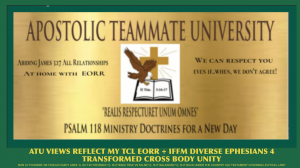Part 2 CHRISTIAN LEADERS TARGETING MANY
The Lost Ministry Art of Mature Relationship Respect:
No More Confronting in Private
(C)2025 Taveau D’Arcy All copyrights reserved under international copyright laws , in conjunction with AI
Main Scriptures. To Google Search and Reflect. Note how these all pertain to a “holy fear of the Lord” “relationship” /”relationships”
-
Matthew 18:15-17
-
Galatians 6:1
-
Luke 17:3
-
1 Timothy 5:19
The Lost Art of Private Confrontation in Ministry
In an age where social media and instant messaging have become the primary means of communication, it’s increasingly tempting for individuals—especially ministers—to handle disagreements and confrontations publicly. However, the Bible provides clear instructions for handling conflicts within the body of Christ.
In Matthew 18:15-17, we see a clear guideline for how to resolve disputes in a godly and restorative manner—one that honors the person involved and protects the unity of the church. Unfortunately, this process is often overlooked or ignored, resulting in public accusations, church splits, and disunity.
In this post, we will take a closer look at Matthew 18:15-17 and Galatians 6:1, among other key passages, to explore how we can restore this biblical principle of private confrontation—an essential tool for unity in the body of Christ.
Matthew 18:15-17 – Confronting in Private
The teachings of Matthew 18:15-17 are crystal clear regarding how we should handle disputes in the Church:
“Moreover if thy brother shall trespass against thee, go and tell him his fault between thee and him alone: if he shall hear thee, thou hast gained thy brother. But if he will not hear thee, then take with thee one or two more, that in the mouth of two or three witnesses every word may be established. And if he shall neglect to hear them, tell it unto the church: but if he neglect to hear the church, let him be unto thee as an heathen man and a publican.” (Matthew 18:15-17, KJV)
Key Insights:
-
Go to Them in Private:
The first step in resolving conflict is private confrontation—go directly to the person who has offended you. This is not an opportunity to vent to friends, on social media, or through church gossip. Matthew 18:15 highlights that this step is an act of love and respect for the person who has wronged you, allowing for restoration without embarrassing them publicly. -
The Goal is Restoration:
The ultimate goal of confrontation should never be about “winning” or proving someone wrong. It should always be reconciliation—gaining your brother or sister back into fellowship with the body of Christ. This aligns with the teaching of Galatians 6:1, where Paul instructs us to restore a person gently, with humility and care, not with arrogance or judgment. -
Escalation Only if Necessary:
If the private confrontation does not lead to reconciliation, Jesus provides a plan for escalation, taking witnesses to confirm the issue, and if necessary, involving the church leadership. However, the goal remains the same—restoration and healing. The church should never become a platform for public shaming but rather a place for grace, truth, and accountability. -
The Final Step – Separate if Necessary:
If all efforts to restore the person fail, Jesus instructs the Church to treat the person like a “heathen” or “publican.” However, this is not a call for vengeance but a recognition that fellowship cannot continue if there is unrepentant sin. Even then, the ultimate goal is for them to return to repentance and reconciliation.
Galatians 6:1 – Restoring with Gentleness
Paul’s letter to the Galatians provides additional clarity on confronting others in the body of Christ.
“Brethren, if a man be overtaken in a fault, ye which are spiritual, restore such an one in the spirit of meekness; considering thyself, lest thou also be tempted.” (Galatians 6:1, KJV)
Key Insights:
-
Restoration, Not Punishment:
This passage emphasizes that the purpose of confrontation is to restore—not punish. The goal is to bring the person back into a right relationship with God and the community, not to shame them or publicly expose them for the sake of public opinion. -
Spirit of Meekness:
The manner in which we confront someone is crucial. Meekness—a spirit of gentleness, humility, and grace—is essential when restoring someone who has fallen. This is not an opportunity to assert authority or “flex” spiritual muscles; it is an invitation to act as a servant and engage with a heart of compassion. -
Humility in Confrontation:
Paul reminds us to consider our own weaknesses before confronting others. We must approach situations of confrontation with the awareness that we, too, are susceptible to sin and failure. This reminder helps us maintain the humility and grace needed to restore others gently.
Luke 17:3 – Take Heed to Yourself
Jesus, in Luke 17:3, gives us another powerful principle about confrontation:
“Take heed to yourselves: If thy brother trespass against thee, rebuke him; and if he repent, forgive him.” (Luke 17:3, KJV)
Key Insights:
-
Rebuke with a Willingness to Forgive:
Confrontation involves rebuke, but it should never be done with a spirit of unforgiveness or bitterness. The call to forgive immediately after a brother repents is just as important as the confrontation itself. This balance of truth and grace enables the ministry to remain a place of restoration and peace. -
Guarding Our Hearts:
The opening phrase, “Take heed to yourselves,” is a reminder to check our own attitudes before confronting others. The act of rebuke is an act of love, but it is also an act of vulnerability and caution. We must guard our hearts from becoming self-righteous or harboring resentment when dealing with conflicts.

1 Timothy 5:19 – Protecting Ministers from Accusations
Paul, in his pastoral epistle to Timothy, addresses the issue of accusations against church leaders:
“Against an elder receive not an accusation, but before two or three witnesses.” (1 Timothy 5:19, KJV)
Key Insights:
-
Protecting Leaders from False Accusations:
Church leaders, especially, should be protected from false accusations. This principle extends the idea of private confrontation to include the need for credible witnesses before accusations are made public. If someone is bringing a serious charge against a leader, it is important to have witnesses to ensure that the charge is legitimate and not motivated by bitterness or personal issues. -
The Role of the Church in Protecting Leaders:
This passage also reflects the importance of the Church in safeguarding its leaders. Accusations should be handled with great care, prayer, and discernment, ensuring that the reputation of both the leader and the ministry are not harmed by unfounded or irresponsible claims.

Restoring the Lost Art of Confrontation
The principles outlined in Matthew 18, Galatians 6, Luke 17, and 1 Timothy 5 emphasize the importance of private confrontation in ministry. In a world of social media, where public shaming and accusations can go viral within seconds, it is vital that ministers and Christians alike return to this biblical process.
If we are serious about restoring the body of Christ, we must be willing to engage in private confrontation with love, gentleness, and the ultimate goal of reconciliation. Ministry should never be about creating division or public spectacle, but about building up the body of Christ in truth and love

Practical Applications:
-
Engage in Private Confrontation First:
When there’s a conflict, do not immediately take it to the public. Follow the steps outlined in Matthew 18 and Galatians 6. -
Do So in a Spirit of Meekness:
Confrontations should always be approached with gentleness and humility, considering your own weaknesses. -
Guard Your Heart:
Always check your motivations before confronting someone—ensure it is out of a desire to restore, not to punish or retaliate. -
Be Slow to Accuse:
Be cautious about bringing accusations, particularly against leaders, without credible evidence and witnesses. Always protect the reputation of others.
Closing Thoughts:
Ministry requires careful handling of relationships, especially in a world where disagreements can escalate quickly. Private confrontation is a biblical tool that allows for restoration without causing harm. As ministers, we must seek to restore and reconcile, not to destroy or humiliate. Let us take to heart the lessons from the Scriptures and return to the godly way of resolving conflict with humility, grace, and love.
(C)2025 Taveau Creative Leadership all copyrights reserved under international copyright laws, in conjunction with AI













